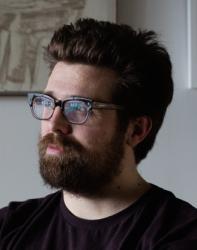
If you have attended a Reykjavík poetry reading in recent years, chances are you have been lucky enough to catch Elías Knörr performing his poetry with his signature flair. While other performers tend to hide their eyes in notebooks and printouts, he addresses the crowd with an intense sincerity, at times lapsing into closed-eyed song if the structure of the poem and the traditions surrounding it calls for such. Certainly, any reader choosing to take the printed versions home with them at the end of the show will have found Elías’s voice echoing in their head through further readings. “I have a fetishistic attachment to printed paper, but I have texts which I only convey live or in a private service,” he explains. “Orality and theatre can be very important in surviving. You need to step on stage if you want your work to be read, understood and taken seriously – even if that’s pure anorgasmia for you.”

Fighting labels and assumptions
Elías has been writing, performing and publishing poetry on the Icelandic scene for close to a decade now, but when put on the spot he is rather vague about his origins, stating simply: “I come from a vagina—as most poets do.” Such flippancy is his means of disarming the island-mentality common to the insular Icelandic community, where immigrants find themselves faced daily with the question ‘where are you from?’
“I still have to fight against the fact that people assume that my texts are translations,” he laments. “Some people will actually ask who wrote my texts for me. First time it happened I cried like a baby, but nowadays I take it as part of my fiction. I try to recycle prejudice as opportunity. The more stupid assumptions people make, the deeper my alter-egos get.”

An interloper on the scene
In fact, the last name ‘Knörr’ is a pseudonym (or a heteronym, according to Elías), rather fittingly derived from an old Icelandic word for a ship. The name helped inform his poetry, but it was also a means of fighting the prejudice that accompanied his taking possession of as cherished a cultural artefact as the Icelandic language.
“My plan was always to use my name to hide within the local scene, allowing my texts to attain objective success regardless of my face or my persona,” he explains. “You can ask Polish-heritage Icelanders how their surnames have helped them find jobs that corresponds to their university education; it’s hard! Instead of going down that road, I decided to twist Icelandic prejudices, and it worked perfectly. It was like a Trojan horse that opened a new way into a locked system. People should do it more often—foreigners as well as natives!”
A forthcoming English translation
This summer will see the forging of yet another incarnation of Elías’s identity, with the publication of an English translation of a selection of his poetry by Reykjavík/Manchester publisher Partus. The translator is Icelandic writer and poet Kári Tulinius, who has previously worked with Elías through Partus’ ‘Meðgönguljóð’ poetry series.
“I can be very perverse when it comes to language, so I was really lucky to get somebody like him to translate me,” Elías admits. “We’re of the same generation and have a similar cultural background, and he also has a good knowledge of medieval Icelandic concepts, which I sometimes misuse and abuse in my poetry. He’s very creative and always eager to get out of his comfort zone. There really is nobody better suited than him to solve the riddles of my translation.”
Culture is everybody’s responsibility
Being a man of many languages, Elías has himself worked as a translator. He makes no qualms about the importance of such work, especially within the modern Icelandic literary scene, which is seen by some old-guards as the final stronghold of the Icelandic language; a haven in need of constant defence against outside influences.
“A good counter-example to the anal-retentive besserwissers who purport to be protecting our pristine Icelandic tongue would be translators,” he points out. “Nobody has to be more strict and know-it-all when it comes to language than translators, and yet they’re the most creative and open-minded people you can find! Culture does not come from romanticisms about blood or nature; it’s a matter of sharing and cultivating knowledge, and it’s everybody’s responsibility.”
He shrugs.
“The Icelandic idea of ‘foreignness’ will probably change drastically in the next 25 years, when newer generations of Icelanders will be used to a different human reality, but the problem goes deeper.”
A tool for change
Elías is adamant about the power of the written word as a harbinger of such changes: “Real literature always breaks preconceptions, that’s why we have to make use of it. Language is a weapon for change, and it belongs to us. I hope younger Icelandic writers are aware of that and are not afraid to use that weapon.”
Read more about Icelandic literature here.
Buy subscriptions, t-shirts and more from our shop right here!















